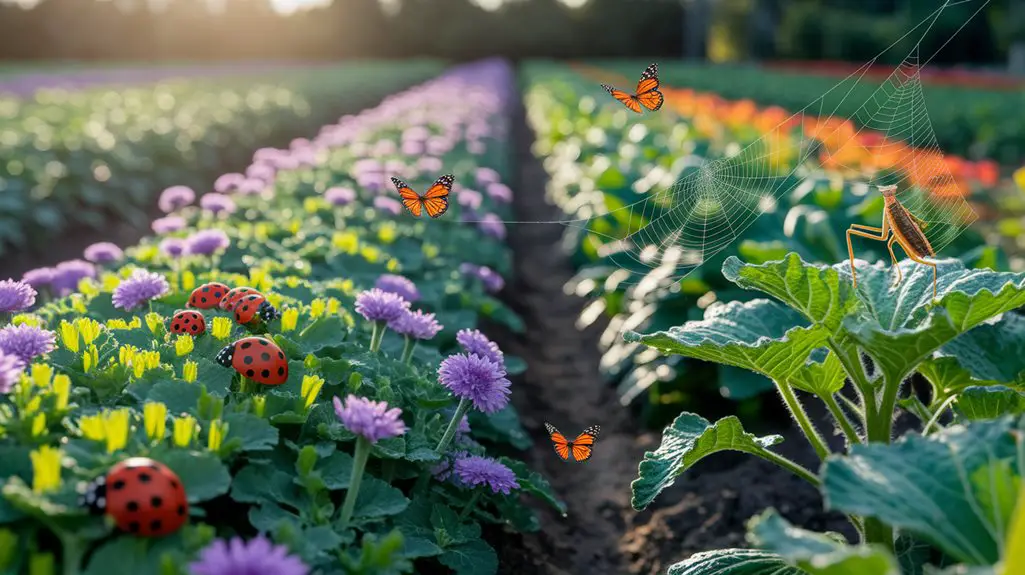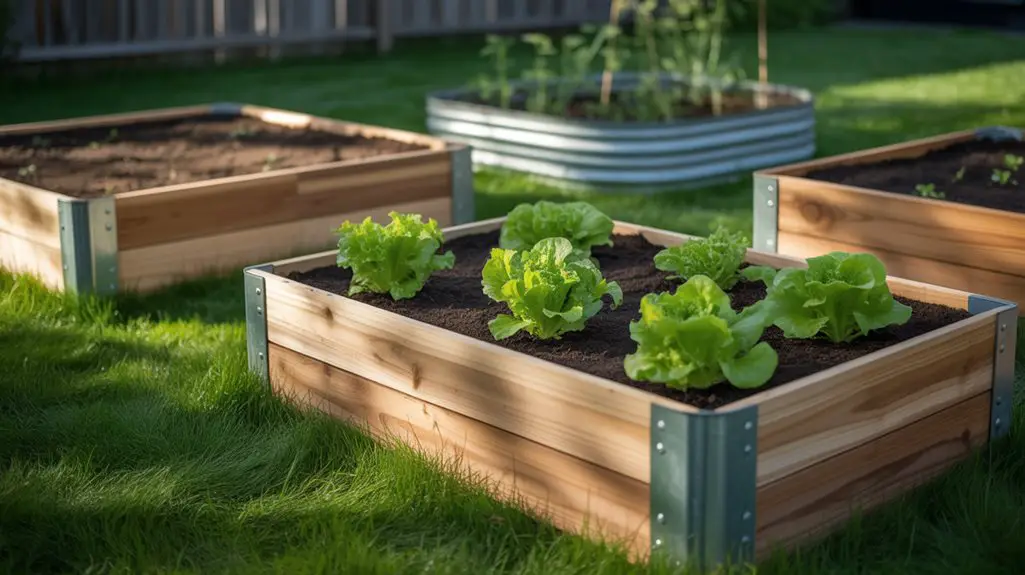Did you know pesticides can remain active in garden soil for up to 20 years after application? Your garden deserves better than synthetic chemicals that harm beneficial organisms and disrupt nature's balance. You can protect your plants naturally while nurturing the ecosystem that supports them. From enlisting insect allies to crafting homemade deterrents, these seven pest control methods will transform how you defend your garden without compromising your environmental values.
Companion Planting: Nature's Defense Strategy
While chemicals may seem like the easiest solution to garden pests, companion planting offers a natural defense strategy that works in harmony with your ecosystem.
By strategically placing certain plants together, you'll create biological barriers against unwanted insects. Marigolds repel nematodes and aphids when planted near tomatoes, while basil deters mosquitoes and flies.
Plant nasturtiums as sacrificial crops—they attract aphids away from your vegetables. Try interplanting aromatic herbs like rosemary and sage throughout your garden to confuse pests with their strong scents.
You'll also boost pollination and overall garden health with this method. Diverse plant communities support beneficial insects like ladybugs and lacewings that naturally prey on garden pests. Additionally, companion planting techniques can enhance soil fertility and nutrient availability, further benefiting your plants.
This balanced approach strengthens your garden's resilience without disrupting the delicate web of life in your soil.
Beneficial Insects: Your Garden's Tiny Guardians

The humble ladybug, hovering dragonfly, and industrious praying mantis aren't just garden visitors—they're your most powerful allies in pest management.
These beneficial insects naturally control destructive pests without chemical interventions.
Ladybugs devour aphids and scale insects, while lacewings target whiteflies and mealybugs. Ground beetles hunt slugs and cutworms that damage young seedlings.
Meanwhile, parasitic wasps lay eggs inside caterpillars, providing invisible yet effective control. Natural pest control methods can significantly reduce the need for synthetic pesticides in your garden.
You can attract these helpful guardians by planting diverse flowering plants like dill, fennel, and calendula. Small water sources and insect hotels offer shelter and hydration.
Avoid broad-spectrum pesticides that kill indiscriminately.
DIY Organic Sprays and Solutions

When harmful garden pests invade your carefully tended plants, you don't need to reach for harsh chemical solutions that damage the environment. Your kitchen cabinets likely contain everything you need to create effective organic pest deterrents.
Mix one tablespoon of neem oil with a quart of water and a few drops of dish soap to combat aphids, mites, and whiteflies. For fungal issues, blend baking soda with water and a touch of vegetable oil.
Garlic-pepper spray—made by steeping crushed garlic and hot peppers in water overnight—effectively repels many insects. Effective natural pest control strategies are essential for maintaining a healthy garden ecosystem.
Remember to apply these solutions during cooler hours and test on a small leaf area first. These homemade remedies biodegrade naturally and won't harm beneficial insects, creating a balanced ecosystem in your garden.
Physical Barriers and Traps for Persistent Pests

Sometimes physical barriers and traps provide the most effective defense against persistent garden pests without introducing any substances into your ecosystem.
These methods create harmonious boundaries that respect nature's balance while protecting your precious plants.
For sustainable pest management, consider these proven options:
- Row covers made from lightweight, breathable fabric shield vulnerable seedlings while allowing sunlight, air, and water to penetrate.
- Copper tape barriers deter slugs and snails through a mild electric charge when they contact the metallic surface.
- Sticky traps in yellow or blue colors attract flying insects like aphids and whiteflies, capturing them before they damage plants.
Additionally, implementing chemical-free pest solutions not only enhances your garden's health but also supports beneficial insect populations.
These physical solutions work with nature's rhythms, creating a resilient garden ecosystem where beneficial insects thrive while problematic pests are managed without harmful chemicals.
Aromatic Herbs as Natural Repellents

Many gardeners overlook the powerful pest-repelling properties hiding within aromatic herbs that can transform your garden into a naturally protected sanctuary. These fragrant plants contain essential oils that confuse and deter common garden pests while attracting beneficial insects. Additionally, effective natural insecticides derived from these herbs can enhance their pest-repelling capabilities.
| Herb | Repels | Where to Plant |
|---|---|---|
| Lavender | Mosquitoes, Fleas, Moths | Borders, Pathways |
| Rosemary | Cabbage Moths, Carrot Flies | Near Vegetables |
| Basil | Flies, Mosquitoes | Tomato Companions |
| Mint | Ants, Rodents, Aphids | Containers (Spreads!) |
| Thyme | Cabbage Worms, Whiteflies | Ground Cover Areas |
You'll find these aromatic defenders work in harmony with your garden's ecosystem, providing a sustainable alternative to chemical pesticides. Simply plant them strategically throughout your garden or in containers to create protective plant communities that naturally support balance.
Crop Rotation: Breaking the Pest Cycle
Crop rotation stands as one of the most powerful yet underutilized strategies in natural pest management, breaking persistent insect cycles without chemical intervention.
By changing what you grow in each area of your garden season after season, you'll disrupt the habitat of pest populations that target specific plant families.
To implement effective crop rotation in your garden:
- Divide plants into families (nightshades, legumes, brassicas, etc.) and avoid planting the same family in the same spot for 3-4 years
- Keep detailed garden maps and planting records to track your rotation schedule
- Consider soil-building cover crops between food crop rotations to further enhance pest resistance
This ancient farming practice not only reduces pest pressure but also balances soil nutrients naturally, creating a more resilient ecosystem within your garden's boundaries. Additionally, natural pest control measures such as companion planting can further enhance the effectiveness of crop rotation.
Soil Health Management for Pest Resistance
While crop rotation disrupts pest cycles from above ground, the foundation of truly resilient gardens begins beneath our feet.
Healthy soil teeming with beneficial microorganisms naturally suppresses many pathogens and supports stronger plants that resist pest damage.
You'll want to regularly incorporate organic matter through compost, which feeds soil life and improves structure.
Maintain proper pH levels (6.0-7.0 for most vegetables) to optimize nutrient availability.
Avoid compaction by minimizing tillage and using designated pathways.
Consider adding worm castings to introduce beneficial nematodes that prey on pest larvae.
Mycorrhizal fungi applications form symbiotic relationships with plant roots, enhancing nutrient uptake and disease resistance. Additionally, incorporating essential plants into your garden can further enhance natural pest control.
Conclusion
Your garden mirrors life's delicate balance—pests and predators dancing in nature's rhythm. By choosing these seven natural solutions, you're not just growing plants; you're weaving yourself back into earth's tapestry. As your hands nurture soil and select companions wisely, you've become both guardian and student of this small ecosystem. Your garden isn't just sustainable—it's a living symbol of our proper place within nature's grand design.




